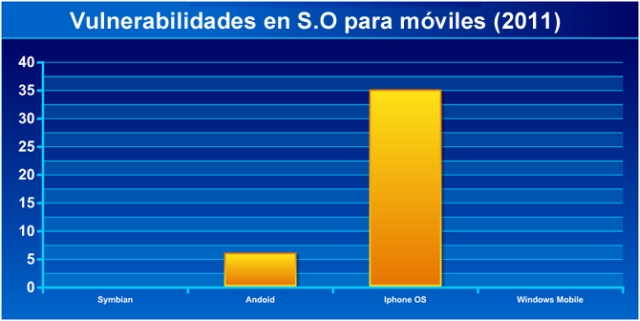
The security company S21sec has just published its second Report on Malware on Smartphones. Its main conclusion is that users are not yet aware that we no longer carry a phone in our hand but a computer and, as such, a machine susceptible to being attacked by malicious software. In terms of platforms, it is surprising that, being iOS the one that registers the most vulnerabilities, hackers do not take advantage of them and are primed by creating viruses for Android.
The report starts from a reality: the number of smartphones is growing explosively. And that explosion is attracting those who previously designed viruses, Trojans, worms, botnets and other computer pests. Now, designing malware for a mobile phone can give them the same fame or the same money (the reasons that encourage them) that attacks against PCs previously offered them.
However, users we still think we have a phone when in reality what we carry on a minicomputer who can make calls. For S21se, the human factor remains the weakest link in the security chain.
By platforms, the report reveals a series of data that can silence certain urban legends. For now, Apple's iOS is not by definition more secure than Android. In fact, 2011 serious vulnerabilities were discovered in Apple's operating system in 35 in front of six detected on Android. These flaws in the code could allow cybercriminals to exploit the hole to create malware for iPhones or iPads.
However, the reality revealed by the study is that there are infinitely more malware for Android than for iOS. The reasons, some of which are highlighted by the report, are various. Even being a more secure system in its base (the kernel) Android has more viruses and attacks because it is more popular. In that, says S21sec, it remembers what happened with the PC and MAC computer platforms. Not that Windows was more insecure than The Macintosh. There is simply more fleet of Windows computers, which makes it more profitable to design malware for this platform.
Another reason is the open nature of Android. Faced with the closed system of the App Store, in the Android world it is possible to root mobile phones, allow the installation of applications other than Google play (indeed, there are several unofficial application stores) ... Even at this point, S21sec doubts that the App Store is more secure. Apple's commitment to security by obscurity makes us really know how much malware is designed for iOS and how much ends up sneaking into the App Store.
All the details of the report S21sec

Freedom is what you have ...
Even malware has its rights… to exist.
Android has 0 vulnerabilities, it is the user who ALWAYS has the final decision and cannot complain about not being aware of the risks involved in any app.
Everything else is information garbage avid for headlines ... where is the front page on ADSLZONE with this study ???
lol
It seems to me that you have a very closed mind. I'm neither IE nor Firefox, I like Opera and I use Opera above all, I think that people who download Firefox and use it is because they don't use IE because, among other things, to my liking, it is the slowest , I just hate it. But because I have Microsoft certification I am not going to defend everything I do, God save me from falling into what you fall into defending Microsoft above all else. It has the most used browser (IE7), obviously , it cannot be uninstalled… .free market yes, monopoly… ..
I never said that Final Fantasy had no soul. I said that they were degenerate and that I found them horrible and artificial in every way. And please don't compare me to a factory video game in which more programmers than designers have participated and in which the Jacket has been programmed first and thought later. Meteoric. It is like comparing God to a priest.